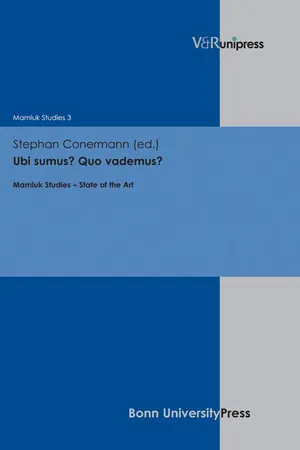
- 362 Seiten
- German
- PDF
- Über iOS und Android verfügbar
eBook - PDF
Über dieses Buch
Sources, which have so far often been overshadowed by chronicles and normative literature, are also the focus of interest of this book. Treatises against unacceptable innovations, pilgrims' guidebooks, travel reports, prosopographical and biographical writings, journals and diaries, folk novels, documents and law manuals can provide us with valuable information. But what generally applies for Mamlukology is the fact that an enormous amount of fundamental work in the edition of texts remains yet to be done. Many Mamlukists are primarily engaged in this activity. It may also have been this unavoidable focus on handwritten materials that resulted in the fact that the scholars studying the Mamluk Era have only very rarely occupied themselves with interdisciplinary questions or theoretical hypotheses. Nevertheless, during the last ten years a lot of innovative research has been done in this field. For the first time, this book presents the state of the art with regards to the Mamluk "Empire".
Häufig gestellte Fragen
Ja, du kannst dein Abo jederzeit über den Tab Abo in deinen Kontoeinstellungen auf der Perlego-Website kündigen. Dein Abo bleibt bis zum Ende deines aktuellen Abrechnungszeitraums aktiv. Erfahre, wie du dein Abo kündigen kannst.
Nein, Bücher können nicht als externe Dateien, z. B. PDFs, zur Verwendung außerhalb von Perlego heruntergeladen werden. Du kannst jedoch Bücher in der Perlego-App herunterladen, um sie offline auf deinem Smartphone oder Tablet zu lesen. Weitere Informationen hier.
Perlego bietet zwei Abopläne an: Elementar und Erweitert
- Elementar ist ideal für Lernende und Profis, die sich mit einer Vielzahl von Themen beschäftigen möchten. Erhalte Zugang zur Basic-Bibliothek mit über 800.000 vertrauenswürdigen Titeln und Bestsellern in den Bereichen Wirtschaft, persönliche Weiterentwicklung und Geisteswissenschaften. Enthält unbegrenzte Lesezeit und die Standardstimme für die Funktion „Vorlesen“.
- Pro: Perfekt für fortgeschrittene Lernende und Forscher, die einen vollständigen, uneingeschränkten Zugang benötigen. Schalte über 1,4 Millionen Bücher zu Hunderten von Themen frei, darunter akademische und hochspezialisierte Titel. Das Pro-Abo umfasst auch erweiterte Funktionen wie Premium-Vorlesen und den Recherche-Assistenten.
Wir sind ein Online-Abodienst für Lehrbücher, bei dem du für weniger als den Preis eines einzelnen Buches pro Monat Zugang zu einer ganzen Online-Bibliothek erhältst. Mit über 1 Million Büchern zu über 1.000 verschiedenen Themen haben wir bestimmt alles, was du brauchst! Weitere Informationen hier.
Achte auf das Symbol zum Vorlesen bei deinem nächsten Buch, um zu sehen, ob du es dir auch anhören kannst. Bei diesem Tool wird dir Text laut vorgelesen, wobei der Text beim Vorlesen auch grafisch hervorgehoben wird. Du kannst das Vorlesen jederzeit anhalten, beschleunigen und verlangsamen. Weitere Informationen hier.
Ja! Du kannst die Perlego-App sowohl auf iOS- als auch auf Android-Geräten nutzen, damit du jederzeit und überall lesen kannst – sogar offline. Perfekt für den Weg zur Arbeit oder wenn du unterwegs bist.
Bitte beachte, dass wir Geräte, auf denen die Betriebssysteme iOS 13 und Android 7 oder noch ältere Versionen ausgeführt werden, nicht unterstützen können. Mehr über die Verwendung der App erfahren.
Bitte beachte, dass wir Geräte, auf denen die Betriebssysteme iOS 13 und Android 7 oder noch ältere Versionen ausgeführt werden, nicht unterstützen können. Mehr über die Verwendung der App erfahren.
Ja, du hast Zugang zu Ubi sumus? Quo vademus? von Stephan Conermann im PDF- und/oder ePub-Format sowie zu anderen beliebten Büchern aus Politik & Internationale Beziehungen & Geschichte & Theorie der Politik. Aus unserem Katalog stehen dir über 1 Million Bücher zur Verfügung.
Information
Inhaltsverzeichnis
- Title Page
- Copyright
- Table of Contents
- Body
- Stephan Conermann: Quo vadis, Mamlukology? (A German Perspective)
- Thomas Bauer: Mamluk Literature as a Means of Communication
- Caterina Bori: Theology, Politics, Society: the missing link. Studying Religion in the Mamluk Period
- Albrecht Fuess: Mamluk Politics
- Syrinx von Hees: Mamlukology as Historical Anthropology
- State of the art and future perspectives
- Thomas Herzog: Mamluk (Popular) Culture.
- The State of Research
- Konrad Hirschler: Studying Mamluk Historiography. From Source-Criticism to the Cultural Turn
- Th. Emil Homerin: Sufism in Mamluk Studies: A Review of Scholarship in the Field
- Carine Juvin: Mamluk Inscriptions
- Paulina B. Lewicka: Did Ibn al-Ḥājj Copy from Cato? Reconsidering Aspects of Inter-Communal Antagonism of the Mamluk Period
- Christian Müller: Mamluk Law: a reassessment
- Lucian Reinfandt: Mamlūk Documentary Studies
- Bethany J. Walker: What Can Archaeology Contribute to the New Mamlukology? Where Culture Studies and Social Theory Meet
- Torsten Wollina: Ibn Ṭawq’s Taʿlīq. An Ego-Document for Mamlūk Studies